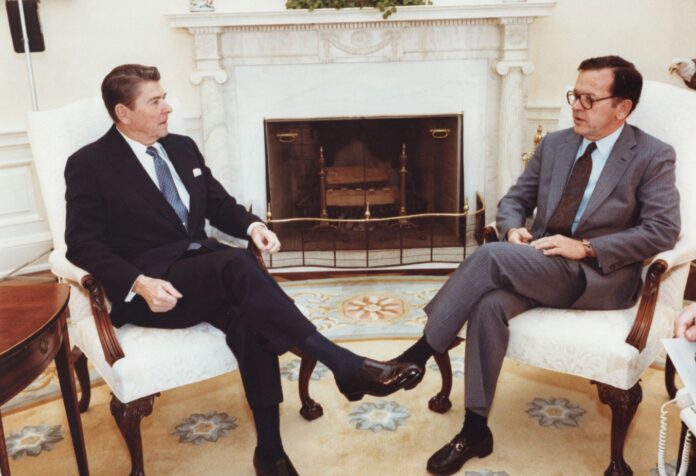A $2 million donation from ConocoPhillips Alaska to the Ted Stevens Foundation will help create the Alaska Leaders Archive at the UAA/APU Consortium Library, the University of Alaska Anchorage announced this week.
The Alaska Leaders Archive project was launched in 2023 with the gift of the records of the late Sen. Ted Stevens to UAA by the Ted Stevens Foundation. The Stevens collection is one of the largest congressional archives in history, documenting the transition of Alaska from a territory to a state and the important legislative accomplishments of Stevens during his 4 decades in the Senate. His work shaped policy in ways that continue to impact the state and the nation today. At the time he left office, Stevens was the longest-serving Republican U.S. senator in history.
“We are excited to partner with the Ted Stevens Foundation as a lead donor to preserve and share our state’s history through the Alaska Leaders Archive,” said ConocoPhillips Alaska President Erec Isaacson. “This is an opportunity to equip future generations of Alaskans with the historical foundation to understand the challenges, triumphs, and lessons of those who came before them. ConocoPhillips Alaska is proud to be part of this significant project, which will empower future leaders and ensure that Alaska’s rich history is preserved for years to come.”
The collection showcases Stevens’ commitment to key issues in Alaska and the nation, including energy, education, healthcare, communications, Indigenous rights for Alaska Natives, amateur sports, Title IX, infrastructure, military, the Arctic, and much more.
The Stevens collection will serve as the cornerstone of the Alaska Leaders Archive, which includes historical collections totaling more than 7,000 boxes from more than 130 Alaska leaders, elected officials, and community figures.
“The Alaska Leaders Archive will provide a window into the leadership and decision making that shaped Alaska’s history,” said UAA Chancellor Sean Parnell, who was governor of Alaska when Stevens tragically died in a plane crash. “Their legacy has a great deal to teach our students and future generations of Arctic leaders.”
In collaboration with the Ted Stevens Foundation, UAA plans to renovate and expand the UAA/APU Consortium Library to house the Alaska Leaders Archive.
“Senator Stevens was a strong believer that challenges could only be solved by bringing different voices and perspectives together. The Alaska Leaders Archive brings together the rich history of that collaboration and we hope it encourages leadership in the same spirit,” said Lily Becker, daughter of Sen. Stevens, who is president of the Ted Stevens Foundation.
The creation of the Alaska Leaders Archive will involve multi-phase construction and renovation at the UAA/APU Consortium Library. The completed project will include the addition of state-of-the-art archival facilities, a teaching area, and space to display items from these important collections.
Stevens served for six decades in the public sector, starting with his service in World War II as a U.S. Army pilot, flying C-46 and C-47 transport planes in the Pacific Theatre. In the 1950s, he moved to Fairbanks to practice law and was appointed U.S. Attorney by President Dwight D. Eisenhower. In 1956, he worked in the Eisenhower Interior Department, where he became the senior counsel and solicitor. He is credited for his role in winning over Eisenhower to the idea of statehood for Alaska. He was elected a state representative in 1964 and elected to the U.S. Senate in 1968.
Stevens survived a witch hunt by a weaponized Department of Justice. Because of the devious actions of prosecutors who hid exculpatory evidence, he was convicted just days before the 2008 election, which he lost. He was later exonerated, and the prosecutors were publicly called out for their reckless professional misconduct, but they were never fired from the Department of Justice for their misdeeds. Stevens died in a plane crash Aug. 9, 2010 in Western Alaska.
